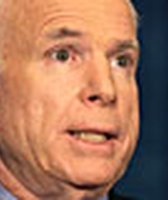Stand up for the facts!
Our only agenda is to publish the truth so you can be an informed participant in democracy.
We need your help.
I would like to contribute
Trying to out-Rudy Rudy
Expanding the New York Police Department is one of the key things Rudy Giuliani says he did to attack crime when he was mayor of New York. And if adding officers really helped decrease crime there, then Giuliani and his fellow New Yorkers should give Sen. Joe Biden a nice big kiss.
Biden was a lead sponsor of a 1994 crime bill that created the federal Community Oriented Policing Services program, or COPS, which was supposed to put 100,000 more officers on American streets from 1994 to 2001.
According to records from the Justice Department's COPS office, New York City was awarded enough three-year grants to hire 4,430 new officers from July 1996 to July 2000. It is unclear if all of them were actually hired, how long they stayed, or how many were working for the city at any one time.
Giuliani was mayor from 1994 to 2001. Through hiring and merging the city's housing authority and transit police departments into the NYPD, he grew the department by almost 12,000 officers, to a peak of nearly 40,000. The COPS grants that Biden espoused could have supplied as much as 10 percent of the entire force, though experts say that's unlikely.
That said, adding cops was was just one of several ways Giuliani and his police chiefs tried to cut crime. They established an innovative crime-mapping program, called CompStat, and targeted small crimes as a way to deter big crimes, as advocated by the Broken Windows theory of policing.
Sign up for PolitiFact texts
And as Giuliani often brags, crime fell by half. Violent crime dropped by 56 percent, and nonnegligent homicide by two-thirds.
But as Politifact has reported before, it's a stretch to give Giuliani's policies all the credit. Same wiih Bidens'.
First, violent crime rates began falling in New York in 1991, three years before Giuliani took office or the COPS program even existed.
Featured Fact-check
Meanwhile, crime rates fell significantly across the nation during the 1990s, including in other big cities. New York wasn't a rarity, it was part of a national trend that remains largely unexplained.
In a city of 8-million people, the number of officers provided by COPS was barely a handful, said Jeffray A. Fagan, co-director of the Center for Crime, Community and Law at the Columbia Law School in New York. He's studied the city's crime trends for years.
"Whether the size of the force produced crime declines at the margins above the secular trend that was underway starting in late '91 is a hard question, but the consensus among social scientists is that the marginal effect is small," Fagan said.
Several studies also have failed to show a correlation between Giuliani's policies and the drop in crime during his mayorship. Rather, experts say, better policing techniques likely combined with other factors, including a break in the crack cocaine epidemic, changing demographics and an improving economy.
So if Giuliani can't take all the credit, neither can Biden. We find his attack Barely True.
Editor's note: This statement was rated Barely True when it was published. On July 27, 2011, we changed the name for the rating to Mostly False.
Our Sources
Community Oriented Policing Services, programs and funding 1994-2004, U.S. Justice Department
U.S. Government Accountability Office, 2005 report on COPS
Heritage Foundation, Research Challenges Claims of COPS Effectiveness, April 5, 2002
U.S. Justice Department crime statistics
Interview, David Muhlhausen, senior policy analyst, Heritage Foundation, Washington
Interview, John Worrall, associate professor of criminology, University of Texas at Dallas and author of February 2007 study published in the journal Criminology on COPS.
Interview, Jeffrey A. Fagan, co-director, Center for Crime, Community and Law, Columbia Law School, New York
Broken Windows: New Evidence from New York City and a Five-City Social Experiment, by Bernard Harcourt and Jens Ludwig.
Do Police Matter? An Analysis of the Impact of New York City's Police Reforms, by George L. Kelling and William Sousa.
The Remarkable Drop in Crime in New York City, by Patrick A. Langan and Matthew R. Durose, Bureau of Justice Statistics, U. S. Department of Justice, October 21, 2004
Browse the Truth-O-Meter
More by Wes Allison
Trying to out-Rudy Rudy
Support independent fact-checking.
Become a member!
In a world of wild talk and fake news, help us stand up for the facts.









































